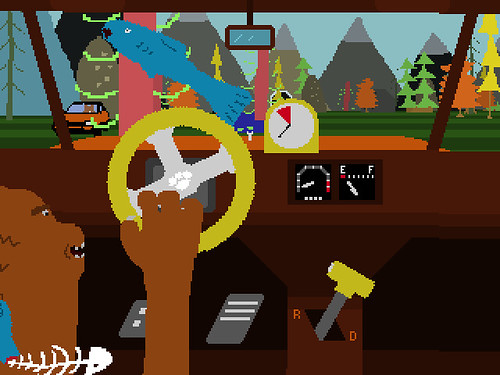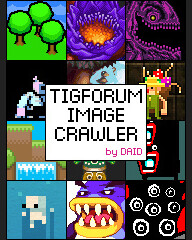Posts from ‘Features’ Category
Two Years of Fez / Fail
By: Brandon McCartin (BMcC)
On: September 14th, 2009

For anyone hungry for Fez content, as I know many of you are, Polytron recently posted Two Years of Fez (or Two Years of Fail), a little retrospective highlighting some of the delightful ways development of the game has gone wrong over the past couple years. Check it out here.
Adult/Educational Compo: Results!
By: Derek Yu
On: September 10th, 2009

The results of the Adult/Educational Competition are in (and have been for a while now, sorry about that)! This was a super-close race between Edmund and Back Door Man, with the former winning by two votes. Congratulations to Farmergnome for winning the grand prize with his controversial game.
The top ten entries were:
1. Edmund – 72 (17.7%)
2. Back Door Man – 70 (17.2%)
3. I HAVE CANDY GET IN THE VAN – 47 (11.5%)
4. Super Cock Blockers – 44 (10.8%)
5. Jirosum – 33 (8.1%)
6. Mr. Jones’ Dream – 26 (6.4%)
7. I Love You 2 – 22 (5.4%)
8. Dildo Tank the First Squirt – 13 (3.2%)
9. Manfred Mansfield and the Invasion of the Alien Men – 12 (2.9%)
10. Sheets – 11 (2.7%)
You can find the full breakdown here. Once again, please be aware that some of these games depict graphic pixel-on-pixel intercourse and are possibly inappropriate for young children, depending on how tight-assed their parents are. Make note of what category the game belongs to before you play.
Does anyone love stats? Here are some: of the top 10 games, 8 were of adult nature, 1 was educational, and 1 was both. Proving once again that people enjoy sex more than they enjoy learning. But everyone loves video games.
Thanks to all the participants! This was a crazy one, and the next one might be crazier. See you next time!
Adult/Education Competition: Voting!
By: Derek Yu
On: August 15th, 2009
Voting is on for the Adult/Educational Competition! Originally, I was planning on doing a sequel to our B-Games Competition over the summer, but rehashing an old theme just didn’t seem right. I feel like TIGSource compos should always push forward into new, and sometimes challenging, territory. The A/E Compo really fit the bill.
Of the 28 finished entries, there were 13 adult entries, 11 educational entries, and 5 brave entries that made use of both themes – glad to see such an even split between the two. There’s some hilariously gonzo stuff in there, but also some thoughtful work. In general, the entrants broke some real ground in genres that are not generally thought of as innovative (if thought of at all).
Congrats to everyone who participated, but especially the ones who finished! PLAY AND VOTE.
The World (of Goo) Wasn’t Built In A Day
By: Brandon McCartin (BMcC)
On: August 13th, 2009
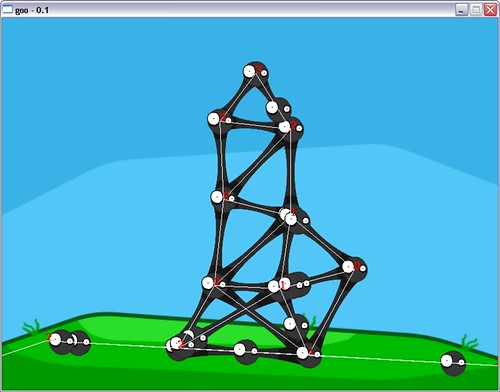
Another one from my backlog: 2D Boy recently completed an ongoing feature on the development of their hit WiiWare game, World of Goo, from the first prototype with placeholder (Family Guy!) graphics, to slightly overambitious later versions of the game. (At one point seven chapters were planned — yikes!) Very interesting stuff if you’re curious to know just what goes into making a great game. They’ve even included downloads of some of the iterations.
I’ve collected all the links here, for your convenience:
Part 1, Part 2, Part 3, Part 4, Part 5, Part 6, Part 7
TIGSource Presents: The Adult/Educational Competition
By: Derek Yu
On: June 27th, 2009
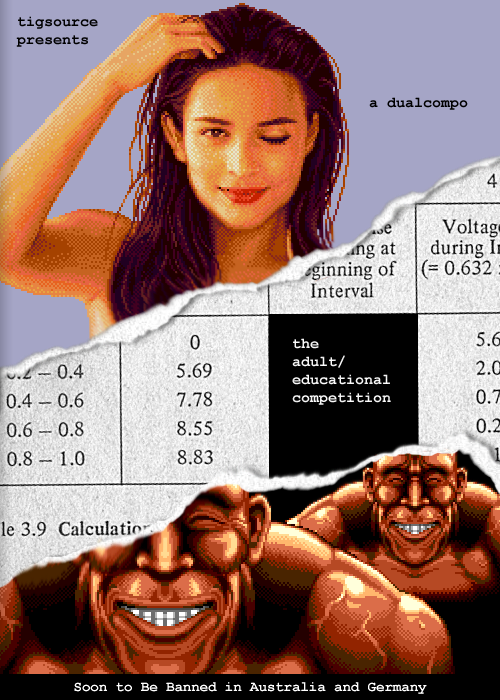
The first-ever TIGSource dualcompo is upon us! The themes are Adult Games and Educational Games, and you can choose to do one or the other… or BOTH! The compo officially starts tomorrow, and you have six flippin’ weeks to come up with an idea and implement it. Start your entry today, before the game burnings begin!
Sex and education – they’re both better when they’re interactive.
Classics Week at TIGSource!
By: Derek Yu
On: June 1st, 2009
Hey, guys! Welcome to Classics Week at TIGSource. All week long, from today’til Sunday we’re going to be covering classic indie oldies that haven’t gotten their due respect on the site and adding them to the TIGdb.
To start us off, I’m going to link some of the classic games we’ve already covered:
- Memories: Brainchild Design
- Memories: Bloodlust Software
- Classic: Kingdom of Loathing
- Classic: Marshmallow Duel
- Classic: Drain Storm
- Classic: Obake
- Multiplayer on One Keyboard: Triplane Turmoil
- Multiplayer on One Keyboard: Tremor
- Multiplayer on One Keyboard: Siege
- Multiplayer on One Keyboard: Gladiator
- Multiplayer on One Keyboard: Liero
- Multiplayer on One Keyboard: Triumph! War 2099
What is considered a “classic?” Anything that you enjoy that is more than a few years old. If you have suggestions, shout ‘em out in the comments, or hit up this thread on the forums. And please write your own “review,” if you’re so inclined. Happy Classics Week!
Cockpit Compo: Results!
By: Derek Yu
On: May 4th, 2009
The results of our Cockpit Competition are in, and the decisive winner, with nearly 15% of the votes, is Justin “Crackerblocks” Smith’s Enviro-Bear 2000: Operation: Hibernation. What else can I say about this game except that it was “bear-y” well made! HAW.
Really, though, the basic concept is enough to make me bust a gut, but what I really love is the look on the bear’s face as he’s grabbing at things in his car. It’s a great use of the theme, too, since it’s very hands-on (paws-on?). Humor, style, creativity, interesting mechanics, and wildlife in motor vehicles – this one’s got it all.
Here are the top ten entries of the compo:
1. Enviro-Bear 2000 – Crackerblocks
2. Okkuplektor – 0rel
3. Star Cannon – tocky, compound, and EEsoteric
4. vectorLocust – jph wacheski
5. Cockpit Crash 1984 – David Pittman
6. Flying Dutchman – astrofra
7. Vessel-IV – muku
8. Aqua Kitty Sub-Sub – moogled
9. Landfall – toastie
10. Viewpoints – agj
To be honest, when I announced the compo I wasn’t sure whether the implied third dimension of theme was going to be a problem for people. Thankfully, I was rightly shamed by the 41 games which got submitted. This was a really fun one to watch develop!
Congratulations to Justin and all the other entrants! Many thanks to everyone who participated and/or helped out with the competition. Coming up next: the one you’ve all been waiting for…
TIGInterview: Rudolf Kremers
By: Leigh Christian Ashton
On: April 18th, 2009

Following on from our recent interview with Alex May, I contacted his colleague and co-creator of Dyson, Rudolf Kremers to find out his opinions on Indie gaming, the IGF, feature creep and Astro Chickens.
Leigh: Rudolf, hello. For those who don’t know you, could you please introduce yourself and tell us a little bit about you?
Rudolf: My name is Rudolf Kremers; I was born in Spain, grew up in the Netherlands, and have been a UK resident for nearly ten years. For all that time I have worked in games, at big studios like EA and smaller ones like Curve, and have worked on anything from Harry Potter to Championship manager to Joystick games. Before that I have been making games as an amateur since the 80s, and indulged in most creative disciplines out there. Last year I decided I had enough of traditional development and started my own company ion order to create games independently.
Leigh: So your current project is the much loved Dyson, with Alex May, can you tell me a little bit about how it all came about?
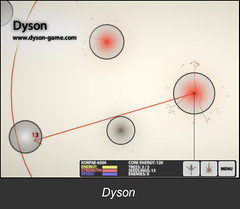 Rudolf: Well, Dyson was an entry to the TIGSource procedural generation competition. We made the first version of the game in 1 month, and got second place! \o/
Rudolf: Well, Dyson was an entry to the TIGSource procedural generation competition. We made the first version of the game in 1 month, and got second place! \o/
Everything worked out really well, we loved the way we worked together, the game was showing real promise, and we were onto something with the procedural elements and the minimalist design, so we have been developing it since. First a much bigger and better version for the IGF, on the basis of which we were nominated for a number of awards, and since then we are working on a full commercial version.
Leigh: Alex is the programmer on Dyson; can you offer some insight into your input on the project?
Rudolf: I am the designer (although we both have input) and I take on additional tasks like level design and audio implementation and whatever else comes up really. Alex and myself work together in a very natural and complementary fashion. We just do what is most appropriate for the individual to do. We hardly discuss roles, we just take on jobs that we are most suited to. :)
Leigh: Dyson was a finalist in the Seumas McNally grand prize category at The Independent Gaming Festival held recently in San Francisco, you and Alex flew out to exhibit Dyson, what was the reaction from the floor like?
Rudolf: I was blown away by the enormous amount of positive feedback we received. It was really quite something. Two aspects stood out for 90% of the people that played the game.
1: They just love the visuals. Utterly. Alex did an incredible job there and people react to it with real passion.
2: The minimalist design. It seems people are really responding to the depth of gameplay that comes out of very minimalist design parameters.
If we have achieved anything it is combining these two aspects to create something that is worthwhile. Another interesting aspect of the IGF was that it was INCREDIBLY BUSY. I can’t believe how many people came by, players and industry veterans or indie developers of all sorts. It was tangible in the air that indie games have turned a corner and that a special wave of creativity is forming.
Leigh: And what were your impressions of the other Indie games on display?
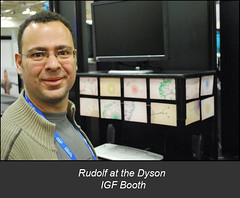
Rudolf: There was an incredible dynamic feeling about the other games. The diversity and level of execution was very high. From thought provoking art games (Jason Rohrer’s Between) to The wonderful Blueberry garden, to the dreamlike “Feistâ€, to the Music game “Musaic Box†Big teams like “Xeno Clash†(Man that game looks interesting) to personal affairs like Edmund McMillen’s “Coil†(Should really be played in a more appropriate setting) or ambient games like Osmos and Dyson.
I am leaving out tons of other ones as well like some of the student games or mobile games. The basic point is that it was to me an uplifting experience to see such a wealth of great game experiences on offer. In addition the indie developers themselves were also fantastic, they were all very supportive and interesting people. They don’t see each other as competitors at all, but as kindred souls.
No wonder we all got on so well ;-)
Leigh: Did you attend any of the talks while at the IGF?
Rudolf: Yeah I went to nearly all IGS sessions. They were superb.
Leigh: was there anything in particular you enjoyed, learned from or agreed with?
Rudolf: Too much to mention, but some things stood out. Simon Carless did a great session about indie sales figures, which painted a very useful picture. As far as I am concerned it is now viable to aim for a career as an indie developer. Cactus gave a hilarious but also poignant session on how to make games in 4 hours, but what it was really about was how to have a mindset that allows on to make great games without being mired in traditions and conventions that in the end don’t really matter. Petri Purho gave an excellent session on his experience creating Crayon Physics Deluxe, and Phil Fish and Kyle Gabler gave a very talk about how to market use PR to get people to know about your game. The indie games rant was good, and there were plenty of other interesting sessions as well notably the “what you always wanted to know about going indie, but were afraid to ask†session by 2dboy.
Leigh: Indie games are really breaking into the general gaming conscious at the moment, Indie games are more than ever in a better position to profit from this, but as they do so, do you see them changing to meet business needs?
Rudolf: To be honest, not at all. All I can see is people adhering to whatever principles they have to make games. These principles can be fiercely artistic, or specifically commercial. Indie is no more and no less than a way of creating games independently from big studios and developers and so on, it does not necessarily dictate the actual content of the game.
Leigh: Do you see this as breaking with the spirit of Independent games?
Rudolf: far from it, I think we are in an incredibly interesting period of indie game development that is go into produce more and even better games for a while yet. This wave is still growing and the added financial possibilities so far work as an enabler rather then a stifler.
Leigh: Do you have an opinion on that?
Rudolf: One of the problems with corporate game development (and there are many problems) is that in many cases it has lost sight of the fact that we are supposed to give the player a worthwhile experience. This comes from many factors: ridiculously overblown game budgets necessitating mega hits which lead to me-too games where everybody tries to imitate the latest successful game, a layer of unaccountable middle management whose incentives are in conflict with many of those that would actually create worthwhile games, and incredible waste due to bad tools and processes. Then there is the weird way the industry treats developers. In corporate game development the actual game creators are pretty much forbidden to interact with their audience, and they are almost never in control of, or regain possession of the IP they develop or are working on. I mean, what on earth can anybody expect to come out of such an environment? There are some games that can only be created in a mega budget corporate environment, and I have no problem with that, bit many games that would benefit from a stronger sense of identity and originality are being forced to compete with those titles. And that is simply not viable. This is why so many mid sized developers have gone under. It has been a massacre really, and the industry has not replied to this crisis in a positive way. So this has provided a rather fertile soil for and independent movement to arrive.
Smaller indie teams don’t suffer from most of these constraints and as a result are making games that offer a viable alternative to so called AAA games. Many players are now realising how much worthwhile material is being produced and that in turn feeds back into the energy and motivation of indie teams.
Leigh: Going back to Dyson, can you talk a little about what influenced its setting and design?
Rudolf: Together with Alex’s input the game’s setting and design was also shaped by a whole bunch of disparate elements that come from my personal obsession with some subjects. To name a few in rapid succession: Freeman Dyson’s ideas like the “Dyson Tree†and “Astro Chickenâ€, Von Neumann’s work, Penrose’s plywood models demonstrating that it was possible to demonstrate aspects of artificial life in simple physical models, Philip k. Dick’s story about endlessly warring robots, some principles of (minimalist) game design I wanted to try out, sci-fi ideas, and more.
(I must admit, I am a proper geek about this stuff)
I talk some more about this stuff on our blog.
Leigh: Has the decision to go commercial impacted the design of Dyson?
Rudolf: Has to a degree, for a moment we were afraid to recognise the basic strengths of the game and started to add features to it out of a fear of not having enough to give to players that will end up buying the game. We saw the fallacy of this however during GDC and are now back on track with finishing the game without adding stuff for spurious reasons. It has also helped however as we have committed to a date, and that made us realise that we could have gone on adding stuff to the game indefinitely, and that would actually not necessarily make for a better game.
Leigh: Was it difficult to keep the feature creep to a minimum?
Rudolf: It threatened to rear its head as I just described, but I think we recognised the danger in time and have dealt with it. It is extra important for us as one of the game’s main selling points is its minimalist approach.
Leigh: So when asked what’s next for you guys, Alex was pretty general and wouldn’t give any details away, can get you to break rank and give us a better idea? :)
Rudolf: Haha!! I can say that we will make more games together :) I also have some of my personal projects bubbling ion the background as well, some of which will eventually come to fruition too. I am leaving that topic untouched for now. I am also finishing a book about level design in the next month or so. Busy busy busy!
Leigh: Dyson is released in July on Direct2Drive and Steam, I’m excited, are you?
Rudolf: It is the culmination of a lifelong dream for me. My main professional/artistic goal in life is to be able to live off my creative output. If Dyson does well I would be over the moon.
Leigh: So I can have a review copy? :)
Rudolf: Yeah, you can pre-order the game if you like? AHAHAH.
Actually you can’t. (Well, I am sure you can get a review copy before release, it is up to you to decide if blatant nepotism is how you want to get ahead in life. Think of the children!!!!)
Leigh: Thanks for your time Rudolf, its been great hearing from you and I think I speak for us all when I say we can’t wait to see the final release of Dyson!
Rudolf: That is very kind of you. We are definitely doing out best to make the game as good as it can be.
Cockpit Competition: Voting!
By: Derek Yu
On: April 15th, 2009
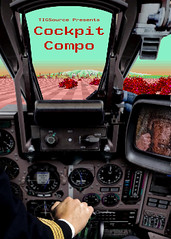
Voting has begun for our TIGSource Cockpit Competition! This was an interesting theme because it implied the use of 3d graphics, or at least pseudo-3d graphics. There’s a great mix of 2d, 3d, and pseudo-3d games amongst the whopping 41 finished entries for this compo. There are even a couple of text-based cockpit games!
You can view and download all the entries here. There are a number of videos for games in here. There’s also a really good post-mortem thread here. Thanks to Fuzz for compiling all the entries and videos!
And thanks to everyone who participated in the competition, especially the entrants! The world of cockpits will never be the same again.
TIGInterview: Alex May
By: Derek Yu
On: April 9th, 2009

Leigh Ashton, AKA Gravious, recently interviewed his good friend Alex May about Dyson, IGF 2009, and what it’s like to be a part of indiedom.
Leigh: So Alex, for those who don’t know who you are, could you please introduce yourself and tell us a bit about your games?
Alex: I’m Alex May. I am fascinated by interactive systems. I currently work in the games industry full time and write the real stuff in my spare time. That’s actually a bit unfair to my current employers. The project I’m on at work is rather fresh, and our own thing by and large. I wrote Cottage of Doom, which won the TIGSource B-Games competition and wrote Dyson along with Rudolf Kremers.
Leigh: You’ve just come back from the Independent Games Festival, how was that?
Alex: It was one of the best weeks of my life. I had never been to America before, never been to a conference before, never been nominated for an award before. It was amazing. Just meeting so many of my fellow indies was more than worth anything I’ve put into Dyson so far. Dyson may not have won the awards for which it was nominated but we really don’t mind about that. The games that did win absolutely deserved to and for us, the nomination itself has been an astronomical boost. Really, it’s been life-changing just to be nominated.
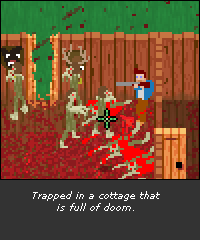
Leigh: Your most recent game Dyson was a finalist for the Seumas McNally grand prize, it started off as an entry in one of the frequently held competitions here on TIGSource, were you surprised at the reaction its received?
Alex: Yes, but also no, in a way. I think I also speak for Rudolf when I say that the response we’ve received has changed the way we think about our work. Personally, I was surprised that so many people could enjoy our game, which I considered to be flawed and incomplete in every aspect. However, we ourselves tried hard to create something a little surprising, so it is good to see that people are finding that refreshing.
Leigh: You’re releasing Dyson commercially through Steam and Direct2Drive in July, How has that experience been so far?
Alex: Super. Both companies have been extremely supportive and responsive. It’s been a breeze, both in terms of being easy to go through the process of signing a deal, and in terms of dealing with people over financial matters.
Leigh: Most commercial games are the product of market feasibility studies and intense demographic targeting, yet indie developers frequently just make the games they want to play. What are your motivating factors in game design or implementation?
Alex: If it’s not fun, we remove it. Eventually. For me, all elements of the design should support each other. Finding ways of doing that can be like piecing together a huge jigsaw puzzle, which might even have bits missing, but eventually you get something like a full picture. For instance, it is important that Dyson trees cost a certain number of seedlings, for the design. But the trees only grow from one spot, right? So for the implementation, I had those other seedlings land on the surface of the asteroid and become grass. For ages we just had them explode in the air and the tree would magically grow out of the asteroid, but now it all makes a bit more sense.
Leigh: Have these ideals moulded Dyson, or since “going pro” have you adopted a more business oriented design approach?
Alex: I think I got a bit scared by going commercial and I wanted to make sure people would get value for money. But in doing that I think I miscalculated what people would see as value, or forgot what made our game valuable, and I helped make plans with Rudolf that might have made the game worse. I talked to Jonathan Mak at GDC and he helped me realise this. We’ve looked at the plans since and applied what we learned from players at the IGF so that we can stay close to the indie dream.
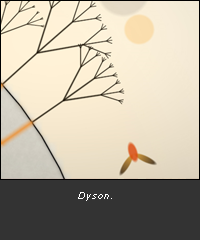
Leigh: What do you think the pros and cons of this approach are?
Alex: Doing it indie? OK here goes: In the Pros corner, you’ve got the love. That’s the main thing. And if you’re not free then you can’t realise that love, make it real. Tale of Tales did a presentation at the Indie Game Maker Rant at IGS where I think they told us how indie they are… or something. The point was, nothing influences them except themselves. That’s what I took away from it anyway. I’m usually quite pessimistic, but I strongly believe that if you stick to your principles then it all works out in the end, regardless of the Cons.
Leigh: A lot of people commented that some of the entrants to the IGF were from mainstream published studios and shouldn’t have been allowed. This raises the question of what it is to be “Indie”. Do you think “indie” is a market, like “Casual” games, and therefore a valid target, or is it simply an ideological stand to the publishers lack of creative risk taking?
Alex: ‘Indie’ isn’t a market, it’s a word, and it’s short for ‘independent’. In this case, independent games. So I don’t think it’s a market, no. I don’t think casual games is a market either. I think there is a clear market for simple, family-friendly downloadable games, because it has been captured and hungrily developed. A market is a place where people go to buy things. All those people know roughly what they will get when they shop at certain places or with certain companies, organisations, brands or people. People who visit Big Fish are Big Fish’s market, and the market for anyone who sells through Big Fish. People who use Steam are Valve’s market, and the market for anyone who sells through Steam. But the so-called casual portals have fallen into the same trap as the mainstream publishers – they’re on to some money and that’s repeatable, and it’s something they can statistically rely on, so they don’t change what they’re doing. This has created the myth of the ‘casual’ game. When people do the same thing a lot it becomes typical. Anyway, these games aren’t casual; some people spend hours on them at a time. What they are is good games that appeal to certain people. A truly casual game would spit you out after half an hour and tell you to come back the next day. Dyson has been called a casual game because it is quite simple, but you can spend hours doing the same clicking and dragging. It’s not casual, it’s just quite easy to play and it’s compelling.
Now if you look around on indie game sites, you’ll see people (developers and consumers alike) complaining that (for example) “all indie games are crap” or “all indie games are unrefined” or “all indie games are arty nonsense”. All this proves, apart from that people are stupid (and we knew that already), is that indie games are diverse, which makes sense because the only creative barriers around an independent game are that there are none. They don’t fit into any one market by definition. They’re just games, and some are good and some are bad and some of them will appeal to you and some won’t.
All that said, there will be a small minority who are interested and any indie game just because it is indie – idealistic consumers and pursuers of creative freedom or pretentious art hipsters? It’s your choice. It could be considered a market by a bad businessman. I don’t think it’s particularly significant in business terms, but at any rate it is interesting to see the positive and negative stigmas that are associated with the word ‘indie’ by the public now.
I try not to let any of this bother me though. Just focus on what you love. That’s a bit hypocritical, because sometimes I say bad things about games or people, but one ought to focus on what one likes and ignore the rest. Do as I say, not as I do! You there! Take your shirt off at the award ceremony!
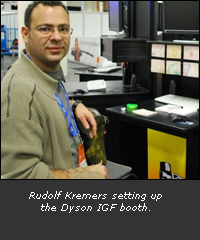
Leigh: could it simply be that the “bedroom coder” has come full-circle?
Alex: They never went away, it’s just that they can more readily make money again now. Great!
Leigh: The irony is, most of the kids making games now probably never used the computers that kickstarted our industry, a 16 year old for instance, wouldn’t have even been born when Commodore imploded, taking the Amiga with it..
Alex: I miss it too man, but you gotta let it go. It’s gone. We’ll always carry it with us. We’ll always have Alien Breed, and Lemmings, and Exile. We’ll always have Workbench, and Deluxe Paint II, and AMOS. Red Sector, Fairlight, and Parallax. 4-Mat, Drax, Tim Wright. Let’s celebrate it, not mourn it!
Leigh: Old games from defunct platforms aren’t as easily accessible to people as say, old books, or even film, do you think this is depriving young developers or even just gamers, of our rich gaming heritage? Is that even a problem, really?
Alex: We write our own history in this respect. There were probably loads of great books written well before their time, as it were, that have not been preserved in enough numbers to be significantly remembered historically. Same with music. It is important to save them. They contain rich history. But they do get saved, and there are people out there saving games, probably to a more efficient extent than any other medium ever. I have seen entire collections of every known game ever released on a platform made available. I checked, and the rarest games I knew were on there and reportedly worked. But really, I know most of what I know of old media from my parents. My dad just bought a DVD of old 1920s jazz MP3s. He spent years collecting tapes and records from that period, only to be able to buy a massive great chunk of it on eBay for four quid. He says it’s the best four quid he’s ever spent.
So teach your kids about old games, why people made them, what trends and forces shaped their creation. It’s important.
Also, I should put a save game system in Dyson. Thanks for the reminder.
Leigh: Do you see a distinction between amateur game makers and indie game makers?
Alex: This comes from that Andrew Doull article. It was stupid then and it’s still stupid because it’s a false dichotomy. Amateur means non-professional. Independent means free. These are not the same. Imagine instead of a single dimension, where at one end of the line you have amateurs and free games, and at the other you have indies and commercial games, you have a two-dimensional space, where on one axis you have amateur and professional, and on the other you have freedom and constraint. Then you will see the real terrain.
Leigh: Where do you see Indie games going from here?
Alex: As a whole it will become, and in many cases has become, a viable medium for people to create any kind of interactive entertainment and live off that to some extent. It’s quite diverse now, with self-published indies operating out of their own sites, and distribution channels available on PC, Mac, XBox 360, PS3, Wii, and mobile platforms. The tools are ripe for picking too – just look around and see the richness: there’s Unity, Game Maker, Multimedia Fusion, BlitzMax, Torque, XNA, pygame, and a ton of other engines and frameworks. There’s never been a better time. If you ever thought about making a game, you can pick up a tool and get to work right now. You can do it.
Leigh: Finally, any tidbits on what you guys are up to after Dyson is released?
Alex: We’re going to work together on another project. I can’t say what that is yet, as we’ve yet to come to a 100% conclusion on it, but we’re both pretty sure of what it will be by now and we’re very excited by that. I want it to be a commercial game, because I want to do this for a living, but that isn’t going to drive me. It will be something we do for the love of it, so no second-guessing the market or focus testing too early, or any of that crap. Rich gameplay and wicked styles.
Leigh: Thanks for answering my questions Alex, some very thought provoking answers! All that’s left to say now is best of luck with Dyson, and are we still cool for the level that spells out my name when you zoom out? ;-)
Alex: I’ll put it in right after that cheque clears.

